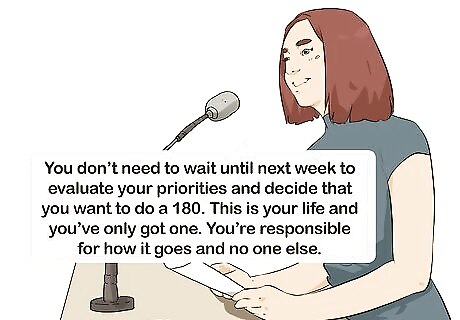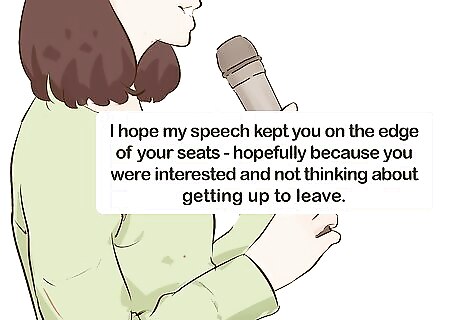
views
Choosing an Impactful Strategy

Repeat the main point of your speech in the ending. While you likely went into detail about your main points throughout your speech, now is the time to summarize it simply. By repeating your message, you'll ensure that the audience hears what you have to say and will still remember it once they've left. If you had three main points in your speech, try to summarize your topics by having one sentence for each point. You might even summarize your points in one sentence by saying, “Remember, tell your family you love them, spend time outdoors, and make time for your hobbies.”

Inspire listeners by ending your speech with a call to action. Make your audience really think about your speech by challenging them to do something. The call to action should be related to your speech so that your ending flows seamlessly and makes sense. You might challenge the audience to spend more time with their loved ones, volunteer in the community, or smile at five people each day. For example, if your speech was about the importance of taking a break from technology, you might challenge the audience to spend a couple hours a day technology-free. Ending your speech by encouraging people to take action will leave them feeling motivated, and they'll be more likely to remember your main talking points.

Tell a story to make the ending personal. A personal anecdote is a great way to make your speech memorable and relatable. Tell the audience a compelling story that shows an example of what you talked about in your speech, tugging at people's emotions and allowing them to visualize your message. For example, if you're speaking about volunteering, you might tell a story about a family's reaction to the house they were given after you spent time building it. While your story shouldn't be too long, give enough details for it to make sense and create a full picture for the audience.

Repeat a certain phrase to make it memorable. If there's a main point you want the audience to remember, repeat it throughout your speech. Then when you get to the end of your speech, make it your final line for a stronger impact. Keep the line short so that it's easy to remember. Your line might be, “Take time to listen,” or “Make positive change.” If you've repeated it several times throughout the speech, the audience might even say it back with you at the end.

Use a famous quote to make an impact. This gives your speech a professional and intellectual feel. Choose a quote that relates to your message and describes what you'd like to tell the audience. You can pick a quote that you think people are likely to know, or choose a lesser-known quote to share with your listeners. You might quote Martin Luther King, Jr. by saying, “Darkness cannot drive out darkness; only light can do that.” Search for the perfect quote by pulling up your online search engine and typing in “quotes about” and then a general theme that you'd like to convey, such as “hard work” or “hope.”

Ask the audience a question as your ending. This is a good way to ensure the audience will reflect on your message. Your question could be asking them how they're going to take action or to think about a certain topic. Make the question meaningful and have it relate to the main message in your speech. If you're giving a speech at a school, you might finish it by asking, “What are you going to do to make time for reading?” or “How are you going to use your knowledge to impact the future?”

Make the audience laugh to end on a note of humor. A great way to make your speech memorable is to have your listeners laughing at a joke you told or a funny story you spoke about. Make sure the humor relates to your speech's main point, and consider trying it out on others to see their reaction before it's time to make your speech. For example, you might say, "I hope my speech kept you on the edge of your seats—hopefully because you were interested and not thinking about getting up to leave."
Perfecting Your Tone

Speak clearly to make sure people understand you. It can be tempting to start talking faster as you get towards the end of your speech, but it's more important than ever to speak clearly and pronounce each word. The end of your speech is what will stick in people's minds, so make sure they're able to understand what you're telling them. If you find yourself speaking quickly, take a breath in between each sentence to help slow you down.

Use a range of inflections when you're speaking. Try to avoid speaking in a monotone voice, and instead give your speech some personality by emphasizing certain words, pausing during your speech, and using a range of tones in your voice. This will help you capture your audience's attention and make it feel more like you're having a natural conversation. Practice mastering your voice inflection in front of a mirror before your speech, paying attention to how your voice sounds as you're speaking. For example, you might raise your voice when saying super important points in your speech, or end a question in a higher voice to get your point across.

Finish your speech with passion. As you near the end of your speech, make sure you're reiterating your main points with enthusiasm. If the audience feels your passion through your words, voice, and body language, they'll be more likely to feel passionate about what you're saying as well. Stand up tall and look at the crowd as you're finishing your speech. If you notice yourself getting a little louder as you're ending your speech, this means the passion is coming through in your voice.




















Comments
0 comment